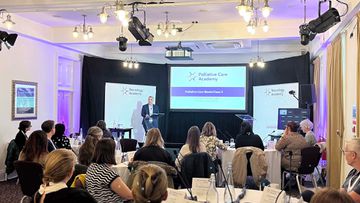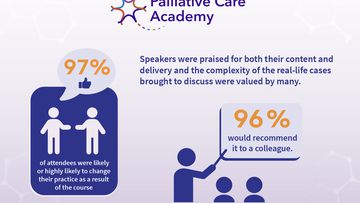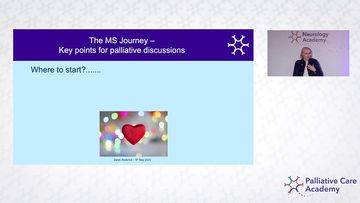Take-home messages from our new neuro-palliative MasterClass
NewsOur all-new Palliative Care MasterClass took place on 4-5th May in Sheffield and with almost double the usual number of speakers for a similar length programme, and deliberate interaction throughout the two days, there was a real atmosphere of intense learning meets multidisciplinary meeting - and an overriding sense of camaraderie.
The condition-themed sections each featured four expert speakers from different disciplines sharing 30 minutes of insight on a particular topic, followed by a collaborative question and answer session on that same theme. Each day ended with a panel of several of the days' speakers discussing a particularly complex case, inviting questions and comments from the floor during each 30 minute case.
The packed programme covered so much content, but consistent throughout were some core messages; the importance of professional collaboration, the need for whole-person, individualised care, and the need to see palliative care outside of its traditional box.
Professional collaboration
Across the two days, it was clear that each professional, and each discipline, brought a unique perspective to any individual case or scenario, and that the best outcome was likely to be found when all those perspectives were brought together.
'I feel quite strongly that there are so many areas of neuro-palliative care that are undefined - we have an opportunity to work together to create solutions.'
Dr Ed Richfield, geriatrician and Faculty lead
There were discussions around when primary palliative care versus specialist palliative care is needed and often, the outcome was that this varies according to the individual and their circumstances. It seemed that good working relationships across palliative care, neurology and medicine for the elderly which support informal discussion and advice-seeking can be as valuable as clear referral pathways and formal MDTs.
This talk turned into a successful collaborative discussion on the bio-psychosocial of behaviour in dementia that challenges. In my view there is a natural gravitation towards such working, if you want best patient outcomes @rcpsychOldAge #palliativecareMC @TheNeuroAcademy https://t.co/EqoS7SP2nT
— David Okai (@davidokai) May 4, 2023
Whole-person, individualised care
One of the most common phrases heard during the two days was, 'it really depends…' There was a real clarity around personalisation, decisions being made on a case-by-case basis, and general principles needing adapting to each individual.
In a couple of her cases, multiple sclerosis (MS) specialist nurse Sarah Roderick highlighted points in that patient's journey where palliative discussions might have been appropriate, each time explaining what sort of discussion, and at what level, were best for that person, and being clear that it was an offer to discuss a topic which the individual could decline.
There was a focus on thinking about situations from the perspective of the patient - their own goals, their quality of life, their preferences, even when those views are at odds with the 'better' clinical outcome.
This was particularly highlighted regarding communication and relating to people with reduced mental capacity, or those in distress.
'The moment that someone feels psychological distress, it adds a significant complexity to their management and it has the greatest impact on their quality of life.'
Dr David Okai, consultant neuropsychiatrist
After using imaging to demonstrate that a person with dementia responds increasingly (and eventually, almost entirely) from their limbic system, occupational therapist Jenny Casson asked delegates 'are we making reasonable adjustments to our expectations, our communications?'
Jenny used a powerful video to highlight the importance of empathy and of recognising the person behind the symptoms and the reasons behind the behaviour; Naomi Neil demonstrating validation and communication through empathy.
Palliative care outside the box
Another message to pervade all discussions and presentations was that palliative care needs to be understood, provided and supported outside the neat box of end of life care and advanced care plans. The application of palliative principles from diagnosis was a constant theme, but more complex were the blurred lines and up-and-down trajectory that come with managing long term neurological conditions.
'Dementia is not seen as a terminal illness, and that's perhaps why people with dementia are less likely to be referred to palliative services. But when does a person stop living with dementia, and start dying with it?'
Prof Karen Harrison-Dening, head of research and publications, Dementia UK
One speaker mentioned a patient with MS who was thought to be in her last year of life and put onto the Gold Standards Framework pathway - eight years ago. She continues to have times where she is thriving and her quality of life is good, and other times where she seems to be approaching the end of her life. She receives palliative care at all times, in its broadest sense, sometimes from her specialist nurse or occupational therapist, at other times from the specialist palliative care team.
There were a number of complex discussions between delegates and presenters around management and support in hospital, and a panel discussion which centred on the challenge of when to treat and when to support someone towards the end of life. Dr Emma Husbands gave a clear argument that sometimes, there is a need for both simultaneously.
'You can symptom-manage and palliate, you can actively treat and provide palliative care - they don't have to be mutually exclusive.'
Dr Emma Husbands, palliative care consultant
Practical take home tools and ideas:
There were a huge number of tools and resources shared during the two days, by speakers and delegates alike. Here's a condensed list of them, as a reminder for those who were there, and a source of ideas and clinical support for those of you who weren't!
Ideas to start employing in practice - tips from speakers:
- Clare Ellis-Smith advocates using an assessment tool like the integrated palliative outcomes scale (IPOS)
there's a dementia, neurology and shortened neurology one available, too (different versions are suited to different needs
Dr Ed Richfield encouraged regularly assessing unmet need and considering the data gained versus time to complete with any of these
Anna Tucker encourages early involvement of speech and language, and use of a fiberoptic endoscopic evaluation of swallowing (FEES) to monitor swallowing and initiate early discussions around preferences for eating and drinking
Everyone should have an advance care plan - Karen Harrison Dening suggests completing your own to get a new perspective on planning discussions
- A delegate suggested a good 'opener' question to help you understand the best approach to take in future palliative or advanced care discussions with a patient:
'Are you the kind of person who likes to take each day as it comes, or who prefers to plan ahead?'
An idea shared was to pop the acronym 'ACP' onto a patients' electronic records any time you or anyone in your team has a conversation with that person around preferences for living and care to help keep track and communicate across the team
- Prof David Oliver recommended a good question to understand whether someone might benefit from discussing future PEG-insertion:
'Do you eat to live, or live to eat?'
Tools and resources:
IPOS-DEM - palliative outcomes scale specifically for people living with dementia
IPOS-neuro and IPOS-neuro8
PACA from the Gold Standards Framework
Needs assessment tool - progressive disease (NAT-PD) - speedy to do, clinician only, assists in knowing whether to manage alone, seek support or escalate care
Downloadable and printable advance care planning documents are freely available via Dementia UK
Pd-Med or Optimal calculators can help work out dispersible alternatives to Parkinson's medications although they are not perfect so should be used as an aid
The Sidecar carers assessment is ideally suited to helping family carers see their own needs
Mytube is a web space featuring information on for people with MND who are considering a gastroscopy tube and Gastronomy tube: is it for me? is a decision-making tool developed by Southampton University, MND Association and Marie Curie.
The SPICT tool can be helpful in assessing the likelihood that an individual is approaching end of life
If you are a pharmacist, Viv Horton recommended joining the Parkinson's disease specialist pharmacy network
Related articles
For every person, at any stage
Palliative Care Academy challenges the idea of palliative care as a late-stage service. Whilst recognising the practical nuances and bespoke approaches needed in palliative care for people with dementia, Parkinson's, MS and motor neurone disease respectively, the Academy promotes a holistic and positive approach to palliative care at any stage of any condition.


